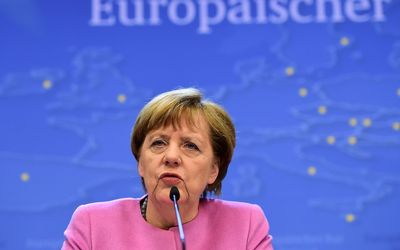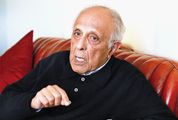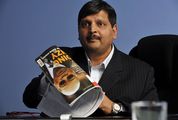Germany will go closest to utopia under bore Merkel
by Simon Kuper,
2016-03-22 05:36:22.0
IF US Republican presidential candidate Donald Trump is the world’s most colourful politician, German Chancellor Angela Merkel is probably the least. She is resolutely tedious even by the standards of German politics. The new German verb "merkeln" means "to do nothing, make no decisions or statement". She never talks about a "German dream", and you will not see her campaign under the slogan, "Make Germany great again".
Even her decision to open Germany’s borders to more than 1-million people last summer was couched in pragmatic language: "Wir schaffen das" (We can do this). Germany’s centre has largely held since, despite advances for the anti-immigrant Alternative für Deutschland in last weekend’s regional elections.
Even amid the migrant crisis, most mainstream German politicians remain boring pragmatists.
Their aim: very slowly improve most people’s lives a little, while averting disaster. That distinguishes Germany from other large countries. In the US, France, and Russia, politics is couched in the language of dreams, greatness and utopia.
There are pragmatic political cultures and utopian ones. Oddly, it’s the pragmatists who get closer to utopia. Utopian politicians raise such high expectations that they can only disappoint. Every US president campaigns in poetry, as a leader who will restore the American dream — but then governs in prose. Pretty soon people start complaining that he hasn’t delivered the American dream, but of course he hasn’t: by definition, dreams are not reality.
Utopians rarely improve people’s lives. That’s partly because they are guided by hallowed old documents rather than by modern best practice. A daft old document such as the Communist Manifesto is particularly damaging, but even a wise one such as the US constitution often misleads. The main reason the US has more than 30,000 gun deaths a year is the second amendment, adopted in 1791.
French politics, too, is packed with misleading old verities. One — derived from the French Revolution — is that "the people" should be mounting the barricades to thwart the government. Another verity, treasured by France’s left, is that "the workers" must fight anything proposed by "the bosses" — imagined as top-hatted capitalists in a 19th-century cartoon.
Most utopians don’t even strive to improve people’s lives. In Germany, by contrast, dreams of greatness have been taboo since 1945. The first postwar chancellor, Konrad Adenauer, campaigned under the slogan "No Experiments". A later successor, Helmut Schmidt, advised: "Anyone who has visions should go to the doctor."
Merkel received an additional anti-utopian inoculation: she spent her first 35 years in a failed utopia, East Germany. Freedom for Merkel means freedom from ideology, explains her biographer, Stefan Kornelius. She is the politician as wonk: facts and analyses rather than stirring rhetoric. Asked once on TV what the word "Germany" inspired in her, she replied: "Pretty, airtight windows."
Most northern European political cultures are similarly boring. Britain, too, has shuffled towards this dull pragmatism. Luckily, the UK has an escape valve that US politics lacks: its fairytale fantasies can be projected on to the royals, allowing the prime minister to be just a functionary.
Boring pragmatic functionaries often make people’s lives better. Northern Europeans lead the world’s happiness rankings. Germany has cut unemployment to a historic low of 6.2% without trashing welfare.
Yet the pragmatists’ greatest achievement goes unseen: averting disaster. In John le Carré’s novel A Small Town in Germany, a British diplomat calls this his lifetime mission. He says, "Every night as I go to sleep I say to myself: another day achieved. Another day added to the unnatural life of a world on its deathbed. And if I never relax, if I never lift my eye, we may run on for another 100 years."
Germans understand the sentiment. They experienced complete collapse in 1945, and again, in Merkel’s eyes, in East Germany in 1989. She once said she possessed "competence in the early detection of collapsing systems". When it looked as if the euro would collapse, she told Bulgarian Prime Minister Boyko Borisov that the "Maya and other civilisations" had disappeared. In other words, today’s Europe could too. Her heroic task: keep politics boring.
Financial Times

Angela Merkel. Picture: AFP PHOTO/EMMANUEL DUNAND
IF US Republican presidential candidate Donald Trump is the world’s most colourful politician, German Chancellor Angela Merkel is probably the least. She is resolutely tedious even by the standards of German politics. The new German verb "merkeln" means "to do nothing, make no decisions or statement". She never talks about a "German dream", and you will not see her campaign under the slogan, "Make Germany great again".
Even her decision to open Germany’s borders to more than 1-million people last summer was couched in pragmatic language: "Wir schaffen das" (We can do this). Germany’s centre has largely held since, despite advances for the anti-immigrant Alternative für Deutschland in last weekend’s regional elections.
Even amid the migrant crisis, most mainstream German politicians remain boring pragmatists.
Their aim: very slowly improve most people’s lives a little, while averting disaster. That distinguishes Germany from other large countries. In the US, France, and Russia, politics is couched in the language of dreams, greatness and utopia.
There are pragmatic political cultures and utopian ones. Oddly, it’s the pragmatists who get closer to utopia. Utopian politicians raise such high expectations that they can only disappoint. Every US president campaigns in poetry, as a leader who will restore the American dream — but then governs in prose. Pretty soon people start complaining that he hasn’t delivered the American dream, but of course he hasn’t: by definition, dreams are not reality.
Utopians rarely improve people’s lives. That’s partly because they are guided by hallowed old documents rather than by modern best practice. A daft old document such as the Communist Manifesto is particularly damaging, but even a wise one such as the US constitution often misleads. The main reason the US has more than 30,000 gun deaths a year is the second amendment, adopted in 1791.
French politics, too, is packed with misleading old verities. One — derived from the French Revolution — is that "the people" should be mounting the barricades to thwart the government. Another verity, treasured by France’s left, is that "the workers" must fight anything proposed by "the bosses" — imagined as top-hatted capitalists in a 19th-century cartoon.
Most utopians don’t even strive to improve people’s lives. In Germany, by contrast, dreams of greatness have been taboo since 1945. The first postwar chancellor, Konrad Adenauer, campaigned under the slogan "No Experiments". A later successor, Helmut Schmidt, advised: "Anyone who has visions should go to the doctor."
Merkel received an additional anti-utopian inoculation: she spent her first 35 years in a failed utopia, East Germany. Freedom for Merkel means freedom from ideology, explains her biographer, Stefan Kornelius. She is the politician as wonk: facts and analyses rather than stirring rhetoric. Asked once on TV what the word "Germany" inspired in her, she replied: "Pretty, airtight windows."
Most northern European political cultures are similarly boring. Britain, too, has shuffled towards this dull pragmatism. Luckily, the UK has an escape valve that US politics lacks: its fairytale fantasies can be projected on to the royals, allowing the prime minister to be just a functionary.
Boring pragmatic functionaries often make people’s lives better. Northern Europeans lead the world’s happiness rankings. Germany has cut unemployment to a historic low of 6.2% without trashing welfare.
Yet the pragmatists’ greatest achievement goes unseen: averting disaster. In John le Carré’s novel A Small Town in Germany, a British diplomat calls this his lifetime mission. He says, "Every night as I go to sleep I say to myself: another day achieved. Another day added to the unnatural life of a world on its deathbed. And if I never relax, if I never lift my eye, we may run on for another 100 years."
Germans understand the sentiment. They experienced complete collapse in 1945, and again, in Merkel’s eyes, in East Germany in 1989. She once said she possessed "competence in the early detection of collapsing systems". When it looked as if the euro would collapse, she told Bulgarian Prime Minister Boyko Borisov that the "Maya and other civilisations" had disappeared. In other words, today’s Europe could too. Her heroic task: keep politics boring.
Financial Times























Change: -1.27%
Change: -1.42%
Change: -1.87%
Change: -1.08%
Change: -2.01%
Data supplied by Profile Data
Change: -0.47%
Change: 0.61%
Change: -1.27%
Change: 0.00%
Change: 0.63%
Data supplied by Profile Data
Change: -0.12%
Change: -1.22%
Change: -0.17%
Change: 0.54%
Change: 0.00%
Data supplied by Profile Data
Change: -0.84%
Change: -1.85%
Change: -2.59%
Change: 0.36%
Change: -2.35%
Data supplied by Profile Data